















Meta Akita aims to support people who have a passion to improve rural areas and Japan as a whole.
By taking small but sure steps forward in all of our projects, we endeavor to keep our enterprise as sustainable as possible. For Queries and questions, please contact below:

The Meta Akita Discord community acts as a hub for official information on all things related to Akita-Inu as well as a communal gathering place for everything from casual chatter to exchange of information.
From the art, music and video making contests for the more artistically inclined to business pitch spaces for the visionaries and entrepreneurs, our team has many regularly scheduled community-building events planned so you’re bound to find your time on the Meta Akita Discord worth your while no matter who you are.
Lastly, members of the official Akita-Inu Preservation Center, and a number of other official authorities/business owners in Akita Prefecture have representatives on the Discord so anyone can reach out to them for anything from questions about Akita-Inu to doing business in Akita Prefecture.


PHASE 1

The ancestors of Japan’s ‘big six’ dog breeds (Shiba, Akita, Hokkaido, Shikoku, Kishu, Kai) descended mainly from two ancient breeds, Jomon and Yayoi. Akita-Inu are said to be a mix of these two.
Their later ancestors were the ‘Matagi-Inu’. They were raised by hunters called ‘Matagi’ who operate within the mountainous regions of Akita. Akita-Inu were formerly called ‘Odate-Inu’.



Robust bodies, limbs and snout
Triangular ears
Tails that curve upwards
Physically powerful, excellent durability(From a long history of being bred/trained as hunting dogs)
Fiercely Loyal (often used as guard dogs)
Mild personalities but obedient.
Fur coat colors:Red, White, Brindled
Sengoku Period (1467-1615)
During the Sengoku period, Akita-Inu served as a guard for feudal lords, then became assistants in hunting bears and deer, and protected their families for long.
Taisho Period (1912-1926)
In the early Taisho Period (1912-1926), a movement to preserve the Akita-Inu and other Japanese dogs began to take place throughout Japan. In 1919, the National Act for the Preservation of Natural Treasure was enacted, and in 1920, a delegation from the Ministry of Home Affairs visited Odate City to conduct a survey, but the Akita-Inu lost its recognition as a Natural Treasure due to the hybridization.
Showa Period (1926-1989)
In May 1927, the "Akita-Inu Preservation Society" was established by local volunteers to protect and breed purebred Akita-Inu and to contribute to the development of culture with Akita-Inu (*The "Nihon-Inu Preservation Society" (Tokyo) was also established in June of the following year). In 1931, a reexamination of Akita-Inu was conducted, and on July 31 of the same year, nine excellent dogs were designated as national Natural Treasure, the first Japanese dogs to be so designated. In 1934, the Akita-Inu Preservation Society started dog registration. The "Akita-Inu Standard" was established and exhibitions were started, but these were interrupted by the Sino-Japanese War and the Pacific War.
WWII (1939-1945)
During the long world war period from the Sino-Japanese War to the Pacific War, the Akita-Inu, a large breed dog, faced a period of hardship. The growing food shortage worsened the Akita-Inu's position, as it required a large amount of food. The fur of Akita-Inu was also used as winter clothing for the military, and the number of adult Akita-Inu was drastically reduced. At the end of the war in 1945, less than 20 Akita-Inu survived and were sheltered by dog lovers.
During the war, the demand for military dogs increased, and there was a movement to use Akita-Inu, a large dog, as a military dog. However, Akita-Inu's characteristics were not suited for military use, and they could not be easily adopted as military dogs. As a result, many Akita-Inu with a shepherd's face were born as a result of crossbreeding with the German Shepherd Dog, which had been used as a military dog. The shepherd-faced Akita was favored by the American occupation forces, and many of them went to the United States, where they are still loved as "American Akita" (also known as "Great Japanese Dog").
Postwar (1945-present)
The Akita Preservation Society has been taking the lead in efforts to restore the Akita-Inu to its original purebred form, based on the few surviving purebred individuals.
The Current Number of Registered Akita-Inu
Although Odate City in Akita Prefecture is the birthplace of the Akita-Inu, fewer than 80 are currently registered in Odate City. At its peak in 1972, more than 45,000 Akita-Inu were registered annually, but currently only about 2,500 are registered annually in Japan. In recent years, the number of Akita-Inu registered overseas has increased rapidly, with approximately 4,000 Akit-Inu registered annually.
Estimated number of dogs kept
・Domestic: 24,500
・Overseas: 10,700 head
・Total: 35,200
Famous Akita-Inu owners
・Helen Keller
・Asashoryu
・Alina Zagitova
The following are the judging standards that apply to exhibitions sponsored by the Akita-Inu Preservation Society.
The Akita-Inu Preservation Society's standards were established in 1938 and have been revised several times since then.
The first item is "Essence and Expression," followed by 15 items for appearance, head, jaws, ears, eyes, proboscis, nose, teeth, chest, abdomen, back and waist, forelimbs, hindlimbs, tail, coat, and coat color, as well as 7 items for point reduction.
~The Story of Hachiko, the Loyal Dog~
In 1924, a young Akita-Inu was delivered to a university professor living in Shibuya, Tokyo.
The dog, named "Hachi," grew up with the professor's love and affection, and soon became a daily routine of taking the professor to and from Shibuya Station. However, in 1925, the professor died suddenly at work. However, Hachi continued to wait for him day after day in front of the ticket gate of Shibuya Station. Hachi became a topic of conversation, and many people showed sympathy for him.
Finally, Hachi began to sleep at Shibuya Station, and continued to wait for his master, who never returned, until his death in 1935.
In April 1934, shortly before Hachi’s death, a bronze statue of him was erected in front of Shibuya Station.
Hachi was born in Odate City, Akita Prefecture.
In 2009, a movie titled "Hachi: A Dog's Tale" starring Richard Gere was made.
Akita Prefecture has several tourist facilities and festivals dealing with the Akita-Inu
Akita-Inu Kaikan, a museum dedicated to Japan's most world-famous dog breed, Akita-Inu, is located in Odate City, Akita Prefecture. The museum was built to commemorate the 50th anniversary of the Akita-Inu Preservation Society. This museum is the only museum in Japan that deals with Japanese dog breeds.
During the "Inukko (Dog) Festival" held in Yuzawa City, Akita Prefecture, snow sculptures of dogs in a dog stance are made at various locations in the city. Amulets named "Inukko" are displayed inside buildings. Many tourists bring their own pets to the festival, wishing for the safety of their family.
Odate City's "Amekkoichi" has a 400-year history. At this festival, stalls selling candy are lined up, and it is said that if you eat this candy, you will not get sick. The festival also includes a parade of Akita dogs organized by the Akita-Inu Preservation Society.
“Turn the town with the fastest declining birth rate and aging population in the world into the most abundant and wealthy town in the world.”

You may already be well versed in Japan’s more famous traditions like eating sushi, kimonos, geishas and samurais… but our team’s home ground, Akita Prefecture, is home to an incredibly rich cultural backdrop that unfortunately does not draw the attention of international eyes very often; something this project aims to change.
It begins with the ancient diet of Hata-hata (sandfish), rice wine and Kiritanpo. Then come the cultural events. The mesmerising sway of tall lantern poles during the Kanto festival… the exhilarating thrill of being chased by a giant demon man through the snow during the Namahage festival… they can only be experienced in Akita. We are also home to many unique crafting techniques such as Kabazaiku and Mage-wappa. The containers made using such techniques can only be found in Akita.
But of course, our adorable Akita-Inu dogs take centre stage.
Despite the incredible richness of our prefecture’s culture, we unfortunately hold the honor of being…
The town with the fastest declining birth rate and aging population in the world. We are physically very far from more densely populated areas like Tokyo and Osaka, and the heavy snowfall serves as a hard barrier to those looking to move here. As such, the rate at which new information, ideas and manpower trickles into the area is extremely slow, which results in the rapid shrinking of our prefecture’s economy.
With the inception of Web1, we as the human race were able to attain information from all around the world… with Web2 we were able to publish information ourselves and interact with others on the web. Now, with the advent of Web3, we will finally be able to transfer actual money through the internet… now wouldn’t that be useful for a certain somewhere with a rapidly stagnating economy and a shrinking workforce?
Akita Prefecture has tried and struggled to attract people, but nothing has worked so far to stop the outflow of population. By combining Web3 technology and Akita’s rich cultural content, we aim to develop engaging, inclusive and decentralised communities, weaving members from all walks of life under the banner of ‘Akita’. We hope the value we bring to those who join our journey with this project will eventually direct more attention from around the world to Akita Prefecture and one day revitalise the prefecture’s economy.


This project and its team operate with the approval of the Akita-Inu Preservation Society. We aim first and foremost to use all the tools of Web3 (NFT’s, SBT’s, cryptocurrency, DAO’s, Metaverses etc.)to start and grow an active economic environment using Akita-Inu dogs as the heart of the project. By creating our own metaverse and eventually connecting it to others around the world, we hope to create “a future where everyone can enjoy Akita”.

We are accepting sponsorship for Akita-Inu, sustainable regional development, and our Web3 projects!
CAO
(AKITA INU OFFICER)
CPO
(PET OFFICER)
DIRECTOR
LEAD DESIGNER
WEB DESIGNER
DESIGNER
DESIGN ADVISOR
WEB ENGINEER
MANY THANKS TO
PEOPLE IN AKITA
※ You can scroll horizontally
Please contact us for a job inquiry or any requests.
